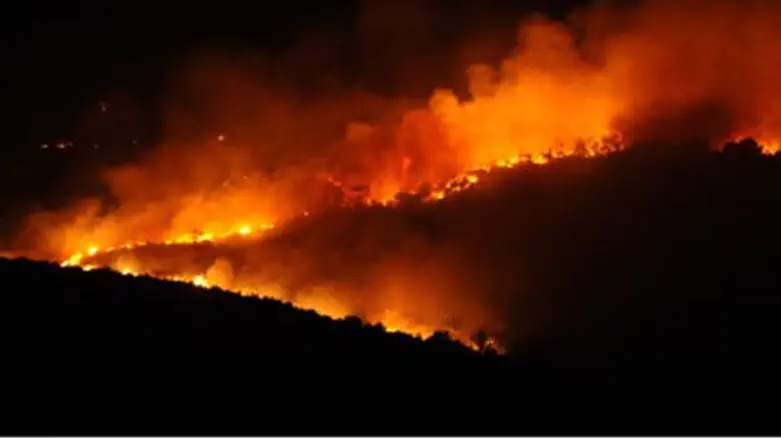
Fire Chief Shimon Roma announced Sunday morning that the worst may be over and "cautious optimism" is at hand but the fire is still raging in a number of locations and total control will take time. Roma told listeners on IDF Army Radio that although the combined strength of Israeli and foreign firefighting teams appeared to have brought the blaze into a more manageable state than that which they confronted on Thursday, they still had a long way to go.
More than 30 firefighting aircraft were gearing up to make their drops of chemical retardant on Sunday morning, including the largest firefighting aircraft in the world -- a privately-owned American Boeing 747. The Evergreen Supertanker, which landed at Ben-Gurion International Airport late Saturday night, can carry up to 80 tons of chemical fire retardant and water at one time -- 16 times the amount of the average firefighting plane -- and was already preparing to make its first drop at 6:00 a.m. Sunday.
After three days of spreading flames and the deaths of 41 people in Israel's worst fire ever, authorities were somewhat optimistic Saturday night that the tide was turning, and that with the assistance of some 33 foreign firefighting aircraft, the Carmel fire could be brought under control within a day or two. However, some sources in the fire department said that it could take as long as a week to completely douse the flames.
The fire is still raging in "Little Switzerland", the verdant mountain road and its wildlife preserve, Mount Shekef near the Druze towns of Daliat El Carmel and Ussefiya, the Nir Etzion, Beit Oren and Yemin Orde Youth Village areas.
All the animals in the wildlife preserve were saved, some by evacuation and some by opening the cages and allowing the non-dangerous indigenous animals to escape to safer areas in time by themselves.
So far, over 50,000 dunams (12,500 acres) of forested area – including some 5 million trees - have been destroyed. However, officials said that the fire had still not been brought under control, and that easterly winds, although weaker than they were Friday, could still spread the fire.
The Jewish National Fund, Keren Kayemet Leyisrtael, whose mandate is forestation, says that thousands of hundred year old trees were destroyed and estimates that many decades will pass before the forests will be restored to their former beauty.
All 41 victims of the fire were identified over the weekend, and the names of 39 of the victims had been released by Saturday night. The youngest victim was Elad Rivan, a 16 year old student from Haifa, who had volunteered to help firefighters. Elad appeared for duty on Thursday, and was killed as he was working with a firefighting crew from Afula that was trapped by spreading flames. Ten of the victims were buried Friday, and another five funerals are so far scheduled for Sunday.
Planes from Switzerland, Russia, Holland, France, Azerbaijan, and Romania on Saturday joined planes from Bulgaria, Cyprus, Greece and Turkey that were working to prevent the spreading of the fire and to douse some of the flames. Over the weekend, Prime Minister Binyamin Netanyahu said that Israel would buy more firefighting planes in order to ensure that future fires are brought under control more quickly.
Speaking to Prime Minister Netanyahu, Palestinian Authority Chairman Mahmoud Abbas said that the PA would be glad to provided whatever help it could in the tragedy, and pledged three firefighters. Netanyahu expressed his gratitude for the offer, saying that “neighbors must help each other.”
In what is being taken as a positive sign, residents of some of the towns that were evacuated Thursday night and Friday, including Tirat HaCarmel and the Denya neighborhood of Haifa, were allowed to return to their homes Saturday night. Authorities said that the smoke cloud over Tirat HaCarmel, which made breathing the air hazardous Friday, had dissipated somewhat, and that the town was now safe from pollution and spreading flames.
Many of the roads that had been closed throughout Friday, including Road 4, the main north-south highway in the area, have been reopened. Police have increased their patrols of the evacuated areas to prevent possible looting of empty houses.
Meanwhile, on Saturday afternoon police arrested two 16 year old youths from the village of Ussefiya, which itself was heavily damaged in the fire, in connection with the inferno. The two brothers were questioned by police, who said that they had apparently had acted with negligence, and did not start the fire intentionally. On Friday night, police said at a press conference that they knew the family who had started the fire, and that they had not acted out of nationalistic or other intentional motivation.
However, reports persisted Saturday that there had been other contributing factors to the fire – specifically, groups and individuals who had thrown firebombs in different areas where firefighters were working, in order to rekindle fires that had gone out. Firefighters and rescue workers reported seeing such individuals throughout Friday, and late in the day, two youths from the village of Daliat al-Carmel were arrested when they were seen acting suspiciously near a site where the flames had recently been doused. They were later released.
Several smaller fires broke out in the Carmel region and in other areas as well, and police said these fires were “copycat arson” blazes being set by individuals or, perhaps, by organized groups. Through Saturday night, police were chasing down suspects who had started a fire in the Jerusalem Forest. A PA Arab and an Israeli Arab were apprehended attempting to set a fire in the valley near Gilo. That fire was doused, and no injuries were reported.